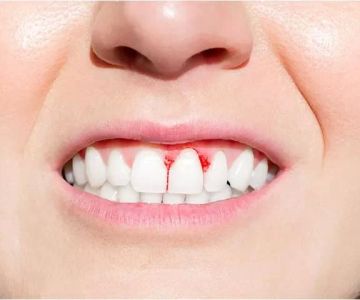
The Connection Between Pregnancy and Oral Health
Pregnancy is a time of great change, not just for a woman's body but for her overall health, including her dental health. While most women are familiar with the physical changes their body undergoes during pregnancy, they might not realize that pregnancy can also have a significant impact on their oral health. Hormonal fluctuations, changes in diet, and increased acid exposure from morning sickness can all contribute to a range of dental issues, from gum disease to tooth decay.
How Pregnancy Affects the Gums
One of the most common oral health issues pregnant women face is pregnancy gingivitis. This condition is characterized by swollen, bleeding gums and is caused by increased levels of hormones, particularly progesterone. These hormonal changes can make the gums more sensitive to plaque buildup, leading to inflammation and irritation.
Many women experience pregnancy gingivitis during their second and third trimesters, and while it typically resolves after delivery, it can cause discomfort during pregnancy. If left untreated, pregnancy gingivitis can progress into more serious gum disease, which can increase the risk of preterm labor and low birth weight. Regular dental checkups and diligent oral hygiene practices are essential to prevent this condition from becoming more severe.
Pregnancy and Gum Disease
Gum disease, or periodontal disease, is a more serious form of gum infection that can develop from untreated gingivitis. This condition is not only harmful to oral health but can also affect the health of the baby. Research has shown that women with gum disease are at a higher risk of preterm birth and having babies with low birth weights. Furthermore, severe gum disease can lead to tooth loss, making it crucial for pregnant women to maintain optimal oral hygiene and seek dental treatment when needed.
Tooth Sensitivity and Cavities During Pregnancy
Increased tooth sensitivity is another common issue for many pregnant women. This heightened sensitivity can be due to changes in hormones, increased acidity from morning sickness, or dietary changes. Many women experience acid reflux or frequent vomiting during pregnancy, which can erode tooth enamel and lead to increased tooth sensitivity.
Dietary habits also play a role in the risk of developing cavities. Cravings for sugary or acidic foods can increase the likelihood of tooth decay. It's important for pregnant women to be mindful of their dietary choices and maintain proper oral hygiene to protect their teeth from the effects of pregnancy-related changes.
Hormonal Changes and Dry Mouth
During pregnancy, women often experience dry mouth due to increased hormone levels and changes in saliva production. This can be exacerbated by dehydration, nausea, and certain medications. A dry mouth creates an environment where bacteria can thrive, leading to an increased risk of tooth decay and gum disease.
To combat dry mouth, it's important for pregnant women to drink plenty of water, chew sugar-free gum, and use saliva substitutes if needed. Additionally, avoiding tobacco and alcohol, which can worsen dry mouth, is essential for maintaining good oral health during pregnancy.
Tips for Maintaining Healthy Teeth and Gums During Pregnancy
Maintaining proper oral hygiene and making wise dietary choices are the most effective ways to prevent dental issues during pregnancy. Here are some helpful tips for expecting mothers:
1. Brush and Floss Regularly
Brushing at least twice a day with fluoride toothpaste and flossing once a day are the foundation of good oral hygiene. Pregnant women should use a soft-bristled toothbrush to avoid irritating sensitive gums and should make sure to clean along the gum line where plaque buildup can occur. Regular flossing helps remove food particles and plaque from between the teeth, reducing the risk of gum disease.
2. Visit Your Dentist Regularly
It is important for pregnant women to continue seeing their dentist for regular checkups and cleanings throughout their pregnancy. Dentists can monitor for early signs of gum disease, tooth decay, and other oral health issues, providing timely treatments to keep the mouth healthy. It's especially important to inform the dentist of the pregnancy so that they can adjust the care accordingly and ensure that no harmful procedures or medications are used during treatment.
3. Use a Mouthwash with Fluoride
Using a fluoride mouthwash can help prevent cavities and strengthen enamel, especially for pregnant women who are dealing with increased acidity in the mouth. Fluoride helps to remineralize the enamel, protecting teeth from decay and sensitivity. Make sure to choose a mouthwash that is alcohol-free, as alcohol can contribute to dry mouth.
4. Stay Hydrated
Drinking plenty of water throughout the day helps keep the mouth hydrated and wash away food particles and acids. Water also promotes the production of saliva, which acts as a natural defense against tooth decay and gum disease. It's particularly important to drink water after meals to help rinse away any food or sugary substances that could contribute to tooth decay.
5. Maintain a Healthy Diet
During pregnancy, a balanced diet is crucial for both maternal and fetal health. A diet rich in vitamins and minerals can help keep teeth and gums strong. Pregnant women should aim to eat plenty of fruits, vegetables, and calcium-rich foods like dairy products and leafy greens. Reducing the intake of sugary snacks and acidic drinks can help protect the teeth from cavities and enamel erosion.
6. Combat Morning Sickness Effectively
For women who experience morning sickness, it's important to rinse the mouth with water after vomiting to neutralize the acids. Avoid brushing immediately after vomiting, as the enamel may be temporarily softened by the stomach acid. Instead, rinse with a baking soda solution or water and wait about 30 minutes before brushing to protect the enamel.
When to Seek Dental Care During Pregnancy
While preventive care is essential, there may be times during pregnancy when a woman needs to seek dental care beyond regular checkups. Some signs that you should contact your dentist include:
- Gum bleeding or swelling that doesn't go away
- Severe tooth pain or sensitivity
- Persistent bad breath or a metallic taste in the mouth
- Visible damage to the teeth, such as cracks or chips
- Signs of a tooth abscess or infection
Ignoring dental issues during pregnancy can lead to complications not just for oral health, but for overall well-being. Early intervention can help protect both mother and baby from potential risks associated with untreated dental problems.
Conclusion
Pregnancy can bring about significant changes to a woman's dental health, but with proper care and attention, these issues can often be managed effectively. By maintaining good oral hygiene, visiting the dentist regularly, and making smart dietary choices, expecting mothers can protect their teeth and gums during this important time. Remember, taking care of your smile during pregnancy is an essential part of taking care of your overall health—and the health of your baby.







 Westgate Dental Arts
Westgate Dental Arts Coventry Family Dental
Coventry Family Dental Familia Dental
Familia Dental Dr. Daniel S. Fife, DDS
Dr. Daniel S. Fife, DDS Dentistry At Suburban Square: Michael I. Wollock, DMD
Dentistry At Suburban Square: Michael I. Wollock, DMD Comfort Care Dental
Comfort Care Dental The Importance of Oral Health Education During Pregnancy for a Healthy Pregnancy
The Importance of Oral Health Education During Pregnancy for a Healthy Pregnancy Why Skipping Dental Checkups Can Lead to Bigger Oral Health Problems
Why Skipping Dental Checkups Can Lead to Bigger Oral Health Problems Advantages of Porcelain Dental Restorations
Advantages of Porcelain Dental Restorations Best Tips for Brushing Your Teeth Properly for Healthy Gums: Essential Techniques for Oral Health
Best Tips for Brushing Your Teeth Properly for Healthy Gums: Essential Techniques for Oral Health How Can Diabetes Cause Tooth and Gum Problems? Preventing and Managing Oral Health Issues
How Can Diabetes Cause Tooth and Gum Problems? Preventing and Managing Oral Health Issues Healthy Habits for Promoting Good Oral Health and Hygiene: Tips for a Healthy Smile
Healthy Habits for Promoting Good Oral Health and Hygiene: Tips for a Healthy Smile